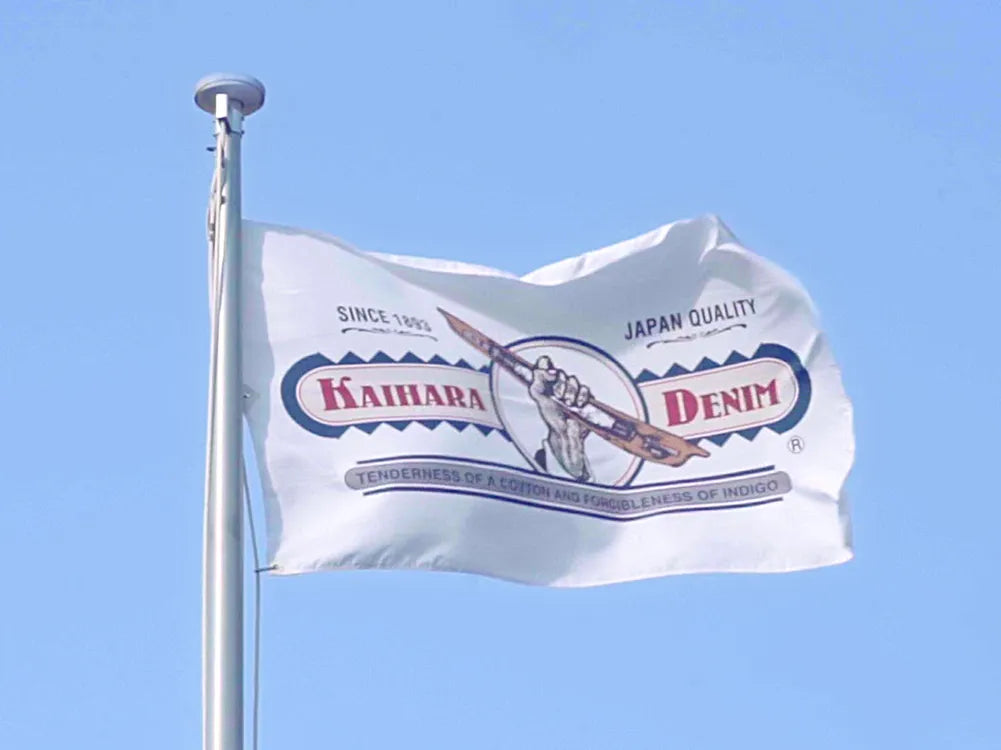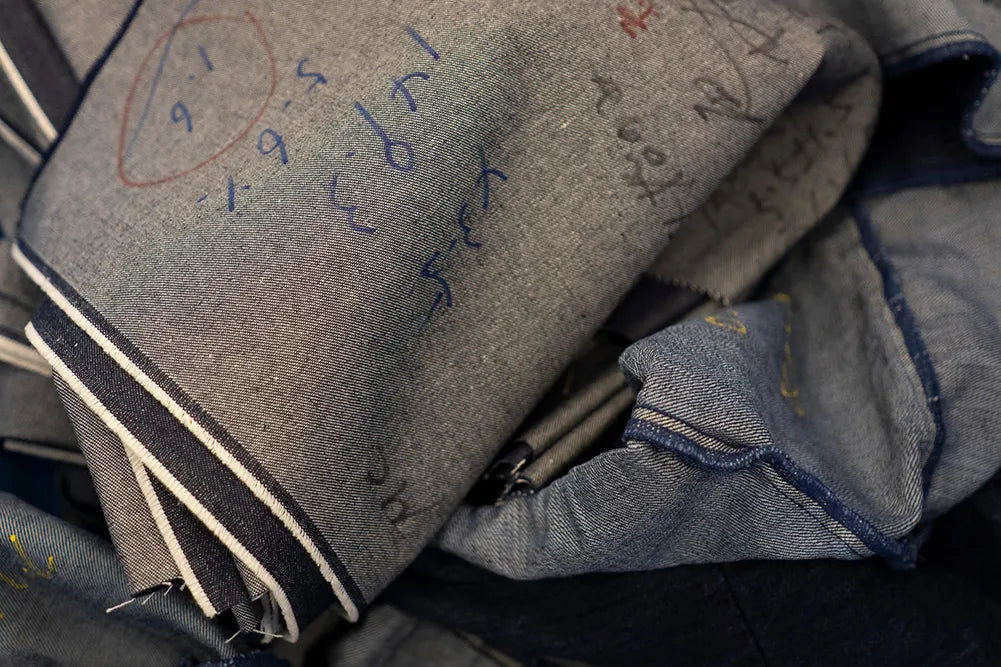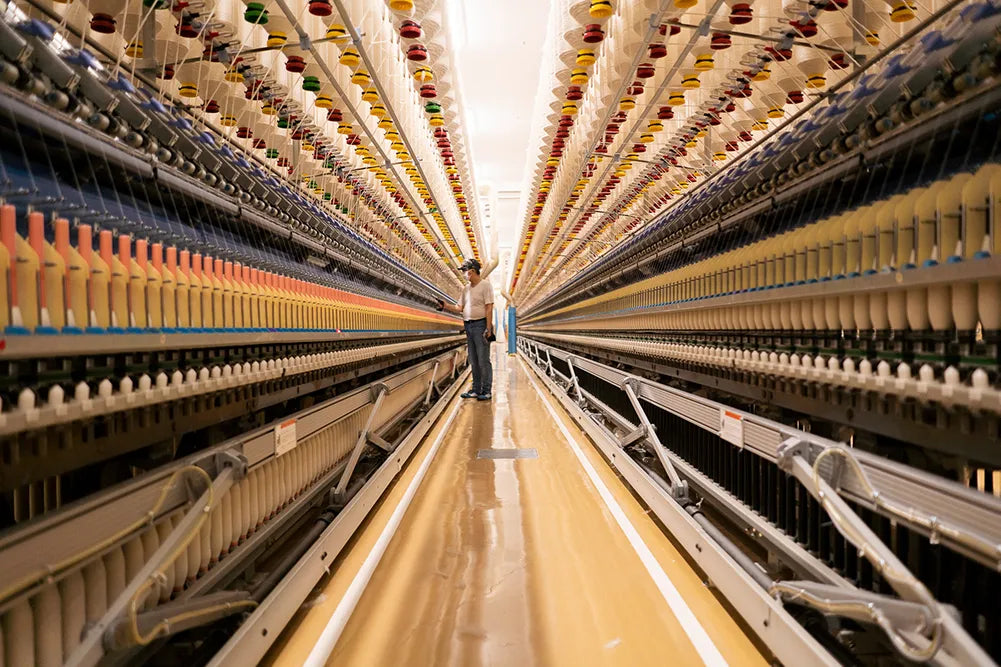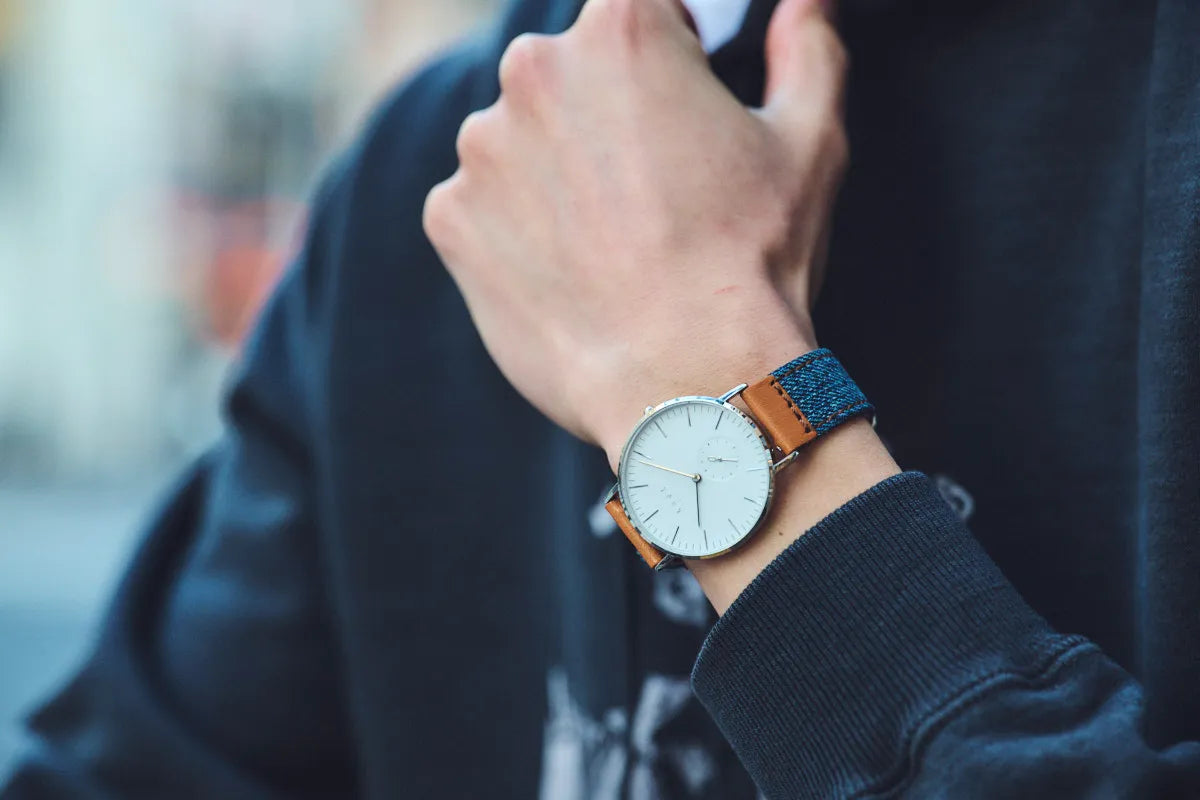

Kaihara Denim is a manufacturer of denim fabric with worldwide recognition. Its products extend beyond apparel to the wristwatch industry, with the company supplying denim fabric to many well-known brands both in Japan and internationally. It is currently the top denim fabric manufacturer in Japan by market share. In this article, we will expand on Kaihara Denim and the reasons behind its dominance in the Japanese market, and present the strap created in collaboration with Knot.
Contents
- The essentials of Kaihara Denim
- Why Kaihara holds the top spot in the Japanese market
- Knot × Kaihara limited edition strap
- Kaihara Denim: pioneers in design and quality
The essentials of Kaihara Denim

Kaihara Denim has a long history which is closely intertwined with its current projects. First of all, we’ll explore the company’s distinctive characteristics and its heritage from past to present.
What is Kaihara Denim?
Kaihara Denim is one of Japan’s leading apparel brands, and boasts a global presence. The company, Kaihara, markets its fabrics under the “Kaihara Denim” name. Its premium denim is created from high-quality fabric which ages beautifully over time, and exceptional denim products are brought to market with a strong design focus. The denim fabric produced by Kaihara Denim is also used by globally celebrated jeans brands such as Levi’s, Edwin, GAP and UNIQLO. The high profile of Kaihara Denim is reflected in its share of the Japanese market, which is over 50%. It is also top of the domestic leaderboard for exports, making it a world-class denim fabric manufacturer at every level.
The story of Kaihara Denim
Kaihara Denim was founded in 1893 by Sukegoro Kaihara, in the city of Fukuyama in Hiroshima Prefecture. The company began as a private business that wove and dyed kasuri fabric, and its pursuit of superior fabric has remained consistent right up to the present day. Its home city of Fukuyama is also known as the production center for “Bingo Kasuri” indigo-dyed textiles, and Kaihara Denim has contributed to raising the profile of this product ever since those early beginnings. After the war, though, demand for kasuri fabric gradually declined, and the company forged a new way forward by developing a new type of wide-width kasuri for Western clothing. This wide-width kasuri later became popular in the Middle East, and so Kaihara began to actively export its products overseas. The export business expanded and grew in scale, until political unrest in Aden, Yemen, led to a sharp decline in demand for wide-width kasuri. The company responded by developing a new denim fabric and also developing its own version of a rope dyeing machine, which had been used in the United States. From that point onward, the main business became the manufacture of denim fabric, and its global name recognition increased rapidly after entering into a business relationship with Levi’s. In addition, in 1991, it became the first company in Japan to establish a system that integrated all processes from spinning to dyeing, weaving and finishing, which is rare even on a global scale. In the present day, Kaihara Denim is highly regarded for its innovative and original approach as a manufacturer.
Why Kaihara holds the top spot in the Japanese market
The innovation and originality that have made Kaihara the top denim manufacturer in Japan can be best understood when divided into categories, which we explore below.

Quality assurance through an integrated in-house production system
When manufacturing apparel products, the various components of fabric processing, such as spinning, dyeing and finishing, are generally carried out by different companies, in order to simplify mass production. However, this method can only uphold a certain level of quality, and it is not suitable for producing premium products. By contract, Kaihara carries out every process in-house, from spinning to dyeing and finishing, and takes charge of every aspect of quality. The company has established its own high-level quality standards to meet the needs of the market and its direct business partners, and its integrated production system makes it possible to produce products that meet these high standards.
Kaihara’s manufacturing innovations can be broken down as follows:
Spinning
Kaihara purchases raw cotton from its carefully selected sources, and performs the spinning at its own factory. By automating each stage of the spinning process, the company has achieved a highly consistent level of quality, which is one of the benefits of their integrated in-house production system. Another factor in the high quality of Kaihara products is that they use their own unique expertise to blend the cotton, to give the denim fabric its desired finish.
Dyeing
Improved dyeing techniques are also essential to ensure the quality of the denim material. Kaihara uses a method called rope dyeing, where the yarn is passed through a dye bath of indigo while still in a bundle form, before being squeezed with rollers. The indigo-dyed thread then turns indigo blue when it comes into contact with air and oxidizes. Kaihara repeatedly dips the thread into the dye to achieve a vivid indigo blue.
Weaving
Kaihara also carries out the weaving process in-house, and the careful work of weaving the warp threads into weft threads also contributes to its high-quality output. Another of the company’s stand-out features is its production method, which involves changing the loom to suit the denim’s characteristics. For example, when creating a vintage denim texture, a shuttle loom is used. The variety of methods allows a wide range of denim fabrics to be manufactured with different specifications.
Finishing
The final process is the finishing. This is especially important for quality control, as it involves removing fuzz from the surface and preventing twisting and shrinkage. At Kaihara, this process is carried out in-house, and the results of the final inspection are also stored in a database which is used for quality improvement and product development. The company’s integrated production system is not only important for the product manufacturing itself, but also from the perspective of product development.
World-class development capabilities
At Kaihara, the sales, engineering and production departments work together to develop products. This enables the company to develop 700 to 800 new product samples each year, and only the very best of these are selected for market – another contributing factor to the company’s high market share.
Thorough approach to environmental conservation
Kaihara has installed the latest wastewater treatment facilities under its own strict environmental standards, considering the impact on the environment of wastewater generated during production activities. Thanks to these facilities, wastewater is treated by specialist staff on a 24-hour basis.
Knot × Kaihara limited edition strap
Kaihara’s denim material is used in a wide range of products, extending beyond jeans and other clothing items. This has cumulated in a collaborative effort with Knot to produce a limited-edition strap in a range of colors.

Kaihara Denim Straight Shape Strap
The main feature of this strap is its jeans-like design, which offers a sense of sophistication. The adjustment holes use the same stainless-steel rivets found in jeans, and the Tochigi leather backing is stamped with the “KAIHARA DENIM” logo. This logo is a special design exclusive to this product, adding an extra degree of exclusivity. Another attractive feature is that, like jeans, the denim ages attractively as time goes by, and the Tochigi leather backing also takes on its own aged appearance. As well as two shades of indigo blue, the strap is also available in white and black denim variants, so you can choose the color to suit your taste.